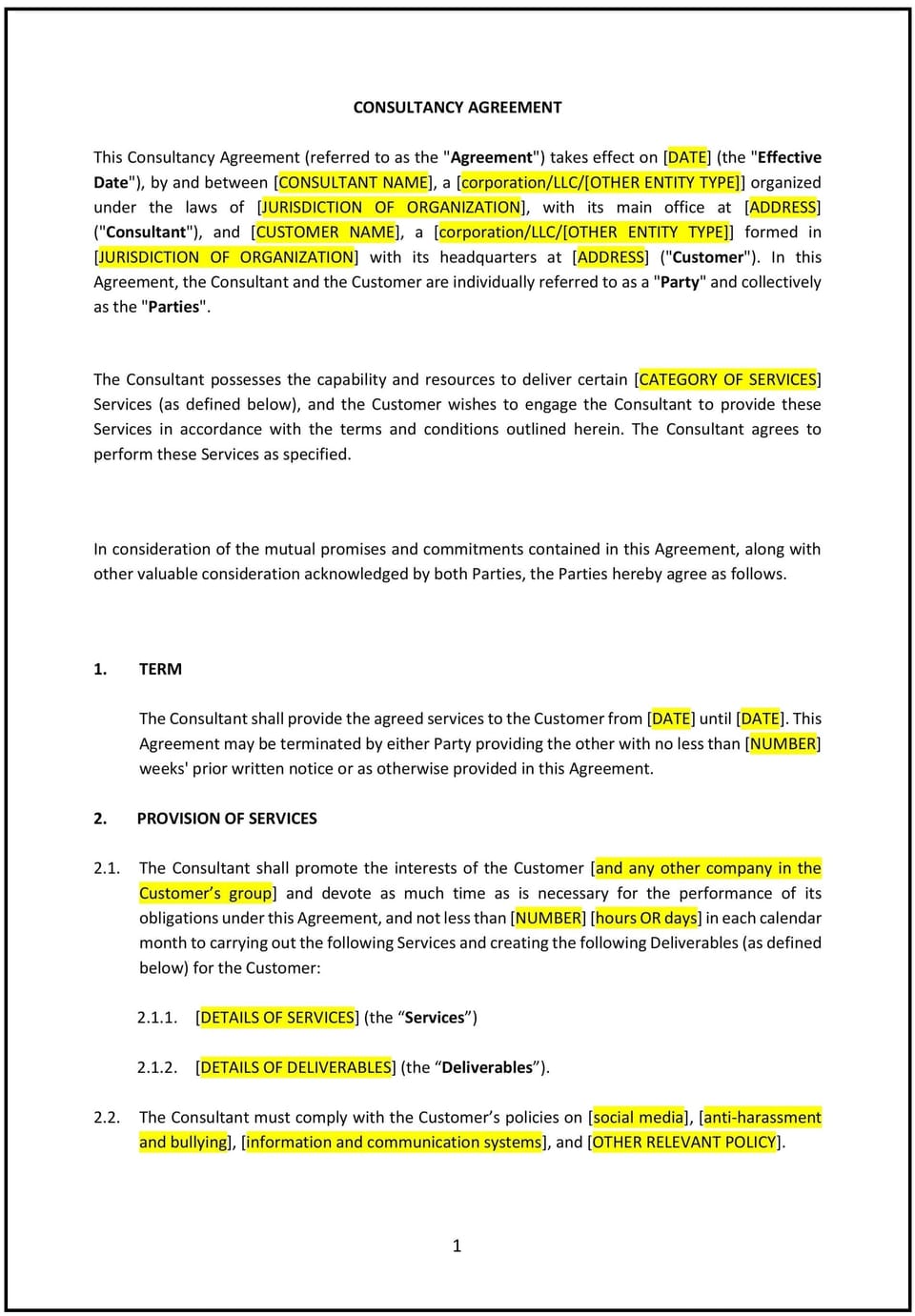Consultancy Agreement (Pro-Customer) (West Virginia): Free template

Consultancy Agreement (Pro-Customer) (West Virginia)
A Consultancy Agreement (Pro-Customer) in West Virginia is a legally binding contract that establishes the terms under which a consultant provides services to a business while prioritizing protections for the hiring company. This agreement ensures that services are delivered according to defined expectations, reducing risks related to performance, confidentiality, and liability.
West Virginia businesses use consultancy agreements to engage specialized expertise while safeguarding their interests. These agreements help companies clarify service expectations, payment structures, intellectual property (IP) ownership, and confidentiality obligations. West Virginia law requires businesses to properly classify consultants to avoid misclassification risks under West Virginia labor laws and IRS independent contractor guidelines.
Industries such as energy, healthcare, finance, and professional services in West Virginia frequently engage consultants to improve business operations, develop strategies, and provide expert insights. A well-drafted agreement protects businesses from risks related to contractor liability, payment disputes, and ownership of deliverables.
Tips for drafting and maintaining a Consultancy Agreement (Pro-Customer) in West Virginia
- Clearly define the scope of work to prevent disputes over project deliverables and expectations. West Virginia businesses should include measurable objectives to ensure clarity.
- Specify payment terms, including hourly rates, fixed fees, invoicing procedures, and penalties for late payments. West Virginia law enforces written payment terms, making them essential for enforceability.
- Include a strong independent contractor clause to prevent misclassification under West Virginia labor laws. The consultant should retain control over work methods and avoid company-imposed schedules.
- Protect confidential information by incorporating non-disclosure obligations, ensuring that proprietary business details remain secure. West Virginia law upholds NDAs when they are reasonable in scope and duration.
- Clarify intellectual property ownership, ensuring that any work product created during the engagement belongs to the business unless otherwise agreed upon. West Virginia businesses should specify whether deliverables are classified as "work made for hire."
- Include a dispute resolution clause specifying whether conflicts will be resolved through West Virginia courts, arbitration, or mediation. West Virginia contract law generally favors alternative dispute resolution methods for efficient resolution.
Frequently asked questions (FAQs)
Q: What should West Virginia businesses include in a Consultancy Agreement (Pro-Customer)?
A: Businesses should outline the scope of work, payment terms, confidentiality clauses, liability limitations, and termination rights to protect their interests.
Q: How does a Consultancy Agreement (Pro-Customer) benefit businesses in West Virginia?
A: It provides clear expectations for consultants while ensuring businesses retain control over deliverables, intellectual property, and service quality.
Q: Are non-compete clauses enforceable in West Virginia consultancy agreements?
A: West Virginia enforces non-compete agreements under West Virginia Code § 47-11E-3, but they must be reasonable in scope, duration, and geographic reach to be upheld.
Q: How can West Virginia businesses avoid misclassifying consultants as employees?
A: Businesses should ensure that consultants maintain control over their work methods, avoid setting fixed work hours, and follow IRS independent contractor classification guidelines to prevent reclassification.
Q: What termination provisions should be included in a Consultancy Agreement (Pro-Customer) in West Virginia?
A: Agreements should specify notice periods, final payment obligations, and post-termination confidentiality requirements to prevent disputes. West Virginia businesses may also include provisions allowing immediate termination for breach of contract.
Q: How can businesses enforce a Consultancy Agreement in West Virginia?
A: West Virginia businesses can enforce agreements through litigation, arbitration, or mediation, depending on the dispute resolution clause in the contract. West Virginia law generally upholds well-drafted agreements that are clear, fair, and properly executed.
Q: Are verbal consultancy agreements enforceable in West Virginia?
A: While some verbal contracts may be enforceable under West Virginia law, written agreements provide stronger legal protections and help avoid disputes over service terms.
This article contains general legal information and does not contain legal advice. Cobrief is not a law firm or a substitute for an attorney or law firm. The law is complex and changes often. For legal advice, please ask a lawyer.


